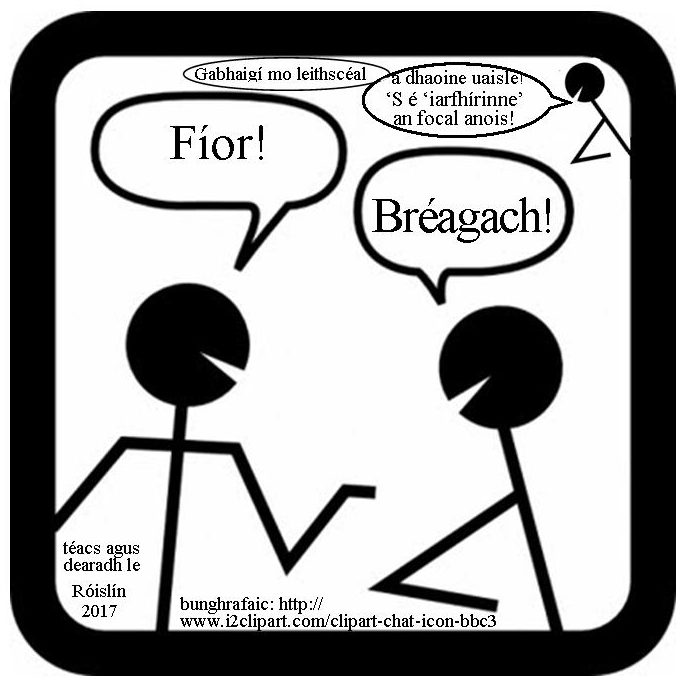How to Say ‘Post-truth’ in Irish (prefixing ‘fírinne’) Posted by róislín on Jan 11, 2017 in Irish Language
(le Róislín)
One of the recent words to achieve popularity in English is “post-truth.” People say we now live in a “post-truth” world, where “an fhírinne” is íosta and/or neamhthábhachtach and/or gan bhaint ar bith le cúrsaí an tsaoil.
So how do we say “post-truth” in Irish, and about how long has the word been around?
No less an entity than Oxford Dictionaries proclaimed “post-truth” the Word of the Year for 2016 (nasc thíos). The word does have an intriguing history pre-dating 2016, but for the Irish translation angle, I’d have to say I’ve only seen “iarfhírinne” (lit. post- or after-truth) in very recent usage (liosta roinnt nasc thíos). Some people have pointed out an Orwellianness to the idea, which could put it in the 1940s, but there’s no evidence that Orwell actually used the word. He dealt a lot with “Newspeak” and “Doublethink,” but not “post-truth” as such.
In English, the first attested use of the word appears to be 1992, but the interpretation was different at that time, more along the lines of “after the truth has been revealed,” i.e. truth that was previously hidden, probably deliberately. Nowadays, the word seems to mean that people don’t even care at all if someone is telling the truth, especially if the listeners like the speaker anyway. Society today seems to place less and less value on accuracy and accountability. We can all make occasional errors, but it’s another thing altogether to institutionalize inexactitude.
As for the Irish equivalent, “iarfhírinne,” I’m sure most people use it today in the more recent sense. However, there’s nothing in the phrasing that precludes the 1990s understanding either. The earliest example of it that I found by Googling is 16 October 2016 (nasc thíos)
The word “iarfhírinne” can be used as an adjective or as a noun. For the adjective use, we have phrases like “saol iarfhírinne” (“post-truth world” OR “post-truth life”). As a noun, we have phrases like “ré na hiarfhírinne” (the era of the post-truth)
For whoever coined the Irish “iarfhírinne,” I’d guess it was a pretty obvious shoo-in as a word choice, but the chance sounds of “iar” and “fhír” suggest an intriguing possibility that the English compound doesn’t.
Here’s the basic pronunciation: EE-ur-EERzh-in-yuh. The prefix (iar-) and the first core syllable (fhír-) are very similar-sounding for two reasons: first, because “fh” is completely silent in Irish and second, because the “i” of “ia” has the same “í-fada” sound as the “í” of “fhír-” even though it’s not marked with the síneadh fada. So although we know when we say it that “iarfhírinne” combines “iar-” + “f(h)írinne,” it could sound sort of like ” *an fhíor-fhírinne” [un EER- EERzh-in-yuh] which, if it existed as a word, could mean “the true truth,” implying that there’s also a fake “truth” (i.e. the fake news that some people either believe is true or that they want to be true).
In theory, then, we could also have “an iar-fhíorfhírinne” [the post-true-truth) and “an fhíor-iarfhírinne” (the true-post-truth). It boggles the mind, but saying them out loud, I’d say they have great béalbhlas, even if the meanings are a little áiféiseach.
Somehow I think James Joyce would have loved this.
Intriguingly, at least to me, the Irish word “iarfhírinne” could have a slightly different slant as well, since “iar-” can mean “former” as in “iaruachatarán” (former president). So could we also use “iarfhírinne” to mean that something used to be considered true but now we don’t consider that truth to be true. Hmm, isn’t truth somehow supposed to be “self-evident”? Food for thought, pé scéal é! Often with words, we mutually agree (often subconsciously) to understand certain words in certain ways in certain contexts, so I don’t think anyone really uses “iarfhírinne” this way (“a former truth”), but in theory, it could be done.
I’m also waiting, with bated breath, for the emergence of an Irish term for “post-truthiness,” to dip into the word widely attributed to Stephen Colbert’s coinage, although apparently there are some precedents. So far, I haven’t found any actual Irish equivalent of “truthiness” as Colbert used it, but I’m going to nominate one, and more nominations are, of course, welcome. I’m going for “fírshínne” [FEERzh-HEEN-yuh] suggesting the elasticity (so-shínteacht) or stretchability (sínteacht) of truth. I was also thinking of “fírinneachtachas, ” but I think I’d translate that more as “truthfulnessishness,” which I don’t think is in wide usage, although I have found it once online, now that I’ve looked for it. So the potential Irish for “post-truthiness” could be” *iar-fhírshínne” [EE-ur-EERzh-HEEN-yuh].
Of course, it could be that the situation is simply polaitíocht iarfhírinne fhinscéalach or polaitíocht iarfhírinne chumtha or polaitíocht iarfhírinne fhicseanúil, suggesting that we are all somehow, science-fictionally-ish, merely players in some Orwellian or Tralfamadorian “ollchluiche” without even knowing it, which is, perhaps, an rud is scanrúla amuigh. Anois nuair a smaoiním air, nár dhúirt Shakespeare rud éigin cosúil leis sin? All the world’s a … stáitse, Nó rud éigin mar sin. – SGF — Róislín
Liosta nasc (webliography)
‘Post-truth’ declared word of the year by Oxford Dictionaries 16 November 2016 http://www.bbc.com/news/uk-37995600
In ord na ndátaí:
nóta tráchta 16 Mí Dheireadh Fómhair 2016 do https://twitter.com/aonghusoha/status/787418683123654657 (15 Mí Dheireadh Fómhair)
‘Like, I made that up’ – Facebook, falsacht agus an fhírinne Ní haon iontas é mar sin go bhfuiltear ag caint thall ar thoghchán na hiar-fhírinne… Cathal Mac Coille Dé Sathairn, Samhain 19 2016 ag 7:30 am http://tuairisc.ie/like-i-made-that-up-facebook-falsacht-agus-an-fhirinne/
Smaointe Fánacha Aonghusa: An Bhlagtacht: Cumasc na mBlaganna Gaeilge ó mo Netvibes; 21 November 2016; http://aonghus.blogspot.com/2016/11/poblacht-chaitliceach.html
http://tuairisc.ie/caithfear-an-chloiteacht-a-chloi-le-linn-2017/ Caithfear an chloíteacht a chloí le linn 2017 Caitheann ár gcolúnaí súil chun cinn ar 2017 – bliain ina gcaithfear an chloíteacht a chloí Alex Hijmans Dé Sathairn, Nollaig 31 2016 ag 7:20 am

Build vocabulary, practice pronunciation, and more with Transparent Language Online. Available anytime, anywhere, on any device.





Leave a comment: